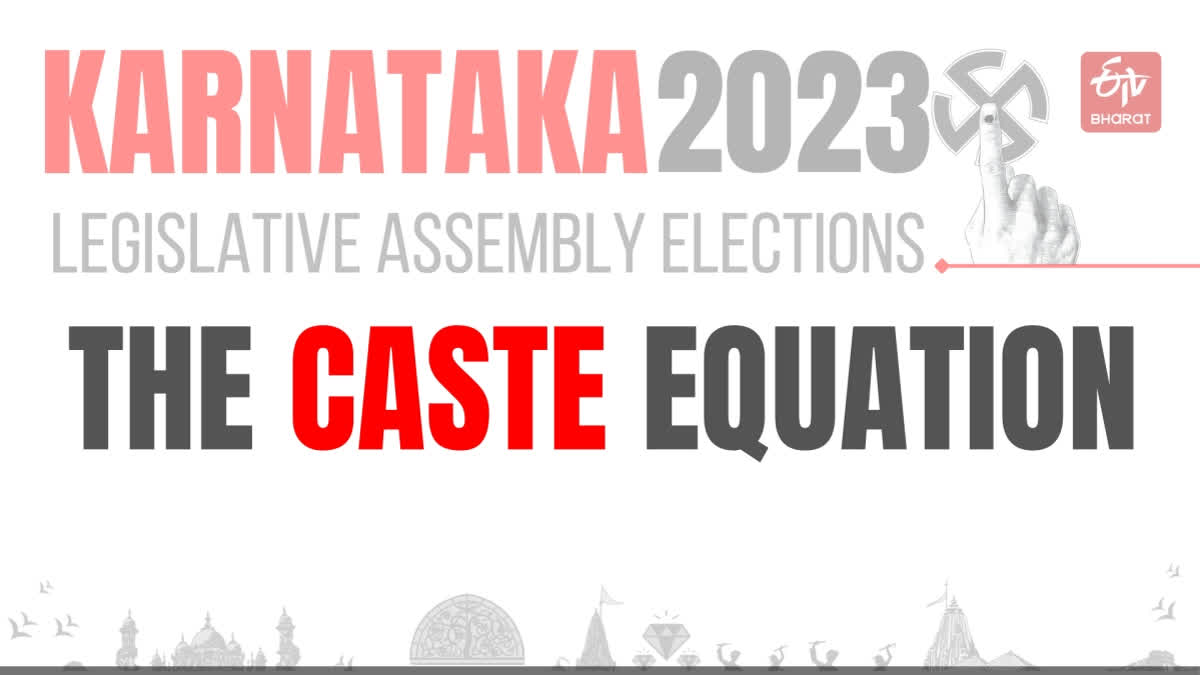Bengaluru (Karnataka): With little more than 17 per cent Lingayats dominating in more than 70 assembly constituencies and 15 percent Okkaligas making them a decisive factor in around 35 constituencies, these two communities hold the key to the crucial upcoming election in Karnataka in May this year. The Schedule Caste and Scheduled Tribe that constitute 24 per cent of the votes might hold the key to more than 50 Assembly constituencies in the State.
Before going into a detailed analysis of the caste demography that primarily sets the political intonation of the day, a quick look at the 2018 election will help us understand things better. Lingayats, who constitute approximately 17 percent of Karnataka's population, are represented by 54 MLAs across parties, including 37 from the ruling BJP. Among the 23 chief ministers from the state since 1952, 10 have been Lingayats.
Vokkaligas, who constitute 15 per cent of Karnataka's population, have 34 MLAs across parties, including eight from the ruling BJP. The JD(S) has also had several Vokkaliga chief ministers. OBCs, who constitute 35 percent of the state's population, are represented by 99 MLAs across parties, with 61 from the ruling BJP.
The strength of the Muslim community in the state is about 13 per cent. The Muslim community is decisive in more than 35 constituencies. Especially in 20 constituencies, Muslim voters constitute more than 30 per cent of the population. The Muslim population is mainly in Sarvagnanagar, Shivajinagar, Shantinagar, Pulakeshinagar, Chamarajpet, Jayanagar, Bidar, Kalaburgi, Vijayapur, Raichur, Tumkur, Mangalore constituencies. The Congress party is confident of getting the votes from the Muslim community.
SC/STs, who constitute 18 per cent of the population, have 46 MLAs across parties, with 27 from the Congress and 12 from the BJP. Brahmins, who constitute three percent of Karnataka's population, have five MLAs, all of whom belong to the ruling BJP.
Not only that in the 2018 elections, out of 67 Lingayat-dominated constituencies, the BJP won 40 constituencies, Congress won 20 constituencies, and JD(S) gained 6 constituencies. Overall, the BJP got 42 per cent vote share while Congress got 38 per cent , and JDS got 11 per cent. Out of 44 Okkaliga-dominated constituencies, JD(S) won 21, BJP 14, and Congress 9. While JDS got 34.66 per cent of votes, Congress got 33 per cent, and BJP got 26 per cent of votes. Out of 18 Muslim-dominated constituencies, Congress won 11 constituencies, BJP 6, and JDS won 1 constituency. In the Muslim-dominated constituencies, Congress got 44 per cent vote share, BJP got 40 per cent, and JD(S) got about 10 per cent.
The Kuruba community is also dominant in the state. This community, which is around 50 lakh across the state, will play a crucial role in more than 50 Assembly constituencies. About 8 per cent of the population of the state mainly in Bidar, Kalaburgi, Yadgiri, Koppala, Davangere Kuruba community is strong. Siddaramaiah is the unquestioned leader of the community.
In March 2023, when the BJP-led government in Karnataka made a crucial move by scrapping the Muslim quota in the state, it triggered a political slugfest but it was a desperate effort of the saffron camp to bring the Lingayats and the Vokkaligas in its fold.
The four per cent reservation has now been re-apportioned equally to the Lingayats and Vokkaligas—the two powerful dominant communities of Karnataka. This move has left the Muslims to compete for the 10 per cent reservation provided for Economically Weaker Sections of the general category, which is decided based on family income.
Also Read: Operation Lotus and BJP’s rise to power in Karnataka; An Analysis
Additionally, the government also decided to accord internal reservations to the Scheduled Castes by increasing the quota for SCs from 15% to 17%. While the new reservation policy has been welcomed by Lingayats and a section of the Dalits, it has drawn the ire of the Vokkaliga, Muslim, and Banjara communities. Reportedly, members of the Banjara community fear that they may be kept out of SCs because of internal reservations.
The BJP's decision to re-apportion the Muslim quota to Lingayats and Vokkaligas has become a contentious issue in the run-up to the state elections. While the move has been welcomed by the Lingayats, who are seen as the traditional vote bank of the BJP, it has been criticized by the Vokkaligas and Muslims, who are worried about their representation. The Vokkaliga community has accused the BJP of pandering to the Lingayats, who already have a significant presence in the state government. Similarly, the Muslim community has accused the BJP of discrimination, pointing out that their representation in the government has been reduced.
The controversy over the reservation policy could impact the high-octane elections in the southern state, with speculations rife over which community will vote for which party. The BJP is expected to retain the support of the Lingayats, but it remains to be seen how much of their effort gets translated into EVMs.



